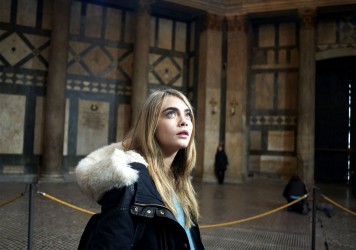A big return-to-form for director Stephen Frears in this lilting transatlantic weepie.
Having ignobly lost his job as a political pundit for the BBC, Martin Sixsmith embarked on an ad-hoc career in what he calls “human interest” journalism. This bland umbrella term comprises of down-to-earth tales of hope and tragedy which remain unsullied by the whirring cogs of Whitehall and bureaucratic gamesmanship.
In Stephen Frears’ Philomena, Sixsmith (Steve Coogan, offering one of his most delicate and refined performances to date) goes in search of this clammy print manna in an attempt to distance himself from his backbiting former occupation. By sheer coincidence, in between deflecting odious barbs at a stuffy white wine soiree, a waitress overhears of his new endeavour and tells him of her saintly mother, Philomena (Judi Dench), an elderly Irish nurse whose son was put up for adoption against her will when she was, during her teens, detained in a convent run by hateful nuns.
This is Frears’ strongest film in quite some time, the simplicity of the material giving rise to a series of ever-more-complex and subtly articulated spiritual quandaries. The material is never rendered as a simple case of theism (Philomena) versus atheism (Sixsmith), and instead has both characters being made aware of the intellectual fallibility of their chosen creed.
The opening, alas, is somewhat shaky, particularly in relation to Philomena’s character and the fact that Dench opts to play her as an updated version of Father Ted’s Mrs Doyle. Her grating naivety and kooky parochial sense of humour are initially framed as opportunities for light mockery, such as when she announces that her favourite restaurant is a Harvester and is later whipped into a wide-eyed tizzy at the fact that Big Momma’s House is screening on television. Cue bemused, secretly disgusted reaction shots from Coogan.
Yet even though the film appears to initially pitch itself as a mis-matched, inter-generational buddy comedy road movie which pokes fun at the obvious class and cultural chasms that exist between its two protagonists, it eventually evolves into something far more sophisticated. Frears never allows the relationship between Sixsmith and Philomena to properly settle, and duly steers clear of icky sentimentalism and Oscar clip euphoria at moments where it could’ve been very easy to veer down that darkened alley.
With a script co-written by Coogan himself, it’s easy to see where Sixsmith’s ball-busting bitch newspaper editor comes from, and the overall credibility of the story is hampered due to her utterly untenable and morally repugnant demands (Sixsmith, though, always at least attempts to weasel out his grim editorial predicament without playing Philomena for a sap, which is apparently par for the course in the world of broadsheet journalism). The character comes across as a nothing more than a weak caricature, so Sixsmith’s motivations too become unclear.
The level at which the film operates best is as a cogent and moving discussion of the consolations of religion. Sixsmith proudly announces himself as a non-believer and scoffs haughtily at Philomena’s devout religiosity as quaint mumbo-jumbo. And though the film appears to be taking Sixsmith’s side (the bygone activities of the Catholic church are given a particularly rough ride), it eventually switches back to suggest that religion doesn’t strictly involve believing in a divine deity, but is merely the existence of human compassion.
The superb final shot (props to ace DoP Robbie Ryan) sees the pair driving off into a gorgeous snow-dappled vista, a landscape which itself looks like it might have been touched by the hand of God.
Published 1 Nov 2013
Frears has been off the boil for quite some time now.
Takes its time, but it gets there in the end.
Subtly sophisticated weepy with Coogan happily trading big thesp blows with Dame Judi.

Stripping away the dazzling veneer of sun-dappled privilege, Stephen Frears reveals a world of betrayal, desperation, bitterness and regret.

Judi Dench reprises her role as Queen Victoria in this touching study of later-life depression.

A stunning performance by Cara Delevingne doesn’t save this ungainly examination of the Meredith Kercher murder.